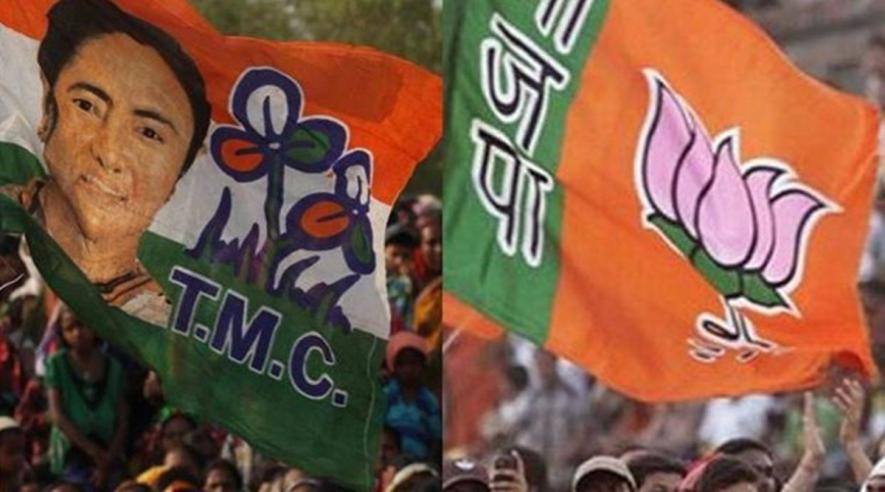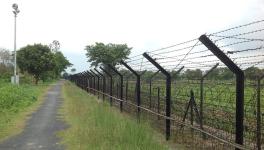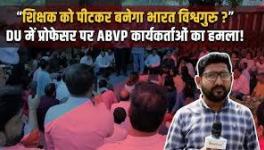Invisible Cost of TMC-BJP Political Standoff Over Discrimination

Representational Image. Image Courtesy: The Financial Express
The Trinamool Congress (TMC) has launched a direct political attack on the Bharatiya Janata Party (BJP), accusing the Centre of fostering a culture of disrespect and systematic marginalisation against the people of West Bengal. Framed under the sharp allegation that “Delhi shows contempt for Bengal,” the party has brought to national attention the increasing perception that Bengalis are being deliberately humiliated, ignored, or sidelined across India.
The charge has gained momentum in recent months, amplified by incidents related to national examinations, alleged discrimination against migrant Bengali workers in other states, and perceived biases in Central schemes and appointments.
NEET and NTA at the Heart of the Storm
At the centre of the latest controversy is the growing anger in West Bengal over the mishandling of the National Eligibility- cum-Entrance Test (NEET-UG) and the functioning of the National Testing Agency (NTA). Students, parents, and educators in the state have raised concerns about paper leaks, delays, irregularities in scoring, and a lack of transparency — all of which have disproportionately affected students from Eastern and Northeastern states.
Trinamool leaders argue that the voices of Bengali students and their families are being dismissed. “How is it that year after year, students from Bengal are forced to fight not just for merit, but for basic fairness? Why are our concerns treated as noise?” asked a TMC MP during a press briefing in Kolkata last week.
Chief Minister Mamata Banerjee has echoed these sentiments, calling the situation “deliberate and discriminatory.” She has demanded an independent probe and called for reforms in national-level examinations, highlighting the issue as one of regional neglect.
Migrant Workers: Silent Discrimination
While the exam-related discontent has triggered headlines, another issue runs deeper and cuts across economic classes — the condition of Bengali migrant workers across the country.
Lakhs of workers from rural Bengal migrate to states, such as Tamil Nadu, Kerala, Karnataka, Maharashtra, Delhi, and Gujarat, in search of livelihood. In recent years, there have been multiple reports of exploitation, wage discrimination, and social stereotyping against these workers.
In Tamil Nadu, political tensions flared earlier this year when fake videos surfaced showing alleged attacks on migrant workers from the North and East. Many of these workers were from Bengal. Though the state government issued clarifications, panic among workers spread quickly. Several returned home abruptly, disrupting industries and families alike.
Trinamool leaders claim that such episodes highlight a larger issue. “There is a pattern. Bengali labourers are treated with suspicion and contempt in multiple states. Their rights are not protected. When they are attacked or humiliated, the Centre remains silent,” said a senior TMC spokesperson.
In Gujarat and Delhi NCR, informal workers from Bengal — particularly those working in construction, housekeeping, and food delivery — have long complained of low wages, arbitrary dismissals, and lack of grievance redressal.
Yet, say Trinamool leaders, there is no serious attempt by the Union government to safeguard the dignity and rights of these citizens.
Cultural and Linguistic Biases
The accusations don’t stop at examinations or labour. The Trinamool Congress has also alleged that Bengali language and culture are often ridiculed or erased in larger national narratives.
The recent NCERT curriculum changes, which removed or downgraded content related to Bengal’s freedom fighters and socio-cultural contributions, sparked outrage in academic and political circles in Kolkata. While historians debated the pedagogical reasoning, the political message was clear — Bengal felt ignored again.
“From Netaji to Tagore, from Raja Ram Mohan Roy to Qazi Nazrul, Bengal has shaped India’s soul. Yet our heroes are being gradually pushed out of national memory,” said an educationist aligned with the TMC’s cultural wing.
Trinamool’s Political Messaging
The party has seized on this cumulative discontent to craft a political narrative that positions Bengal as a victim of Central apathy and BJP-led cultural hostility. Abhishek Banerjee, MP and TMC’s national general secretary, recently told a rally in Howrah: “This is not just about politics. This is about dignity. Bengalis are not second-class citizens. We are being insulted, ignored, and suppressed at every level — in education, employment, migration, and memory.”
The party is using social media, public meetings, student rallies, and workers’ unions to highlight what it calls a “national pattern of Bengali exclusion.” The slogan "Bangla-ke apoman" (Insult to Bengal) is becoming a rallying cry across campuses and trade unions in the state.
BJP's Counter
The BJP has categorically denied the allegations, accusing TMC of spreading regional hatred and playing victim politics. A senior BJP leader from Bengal said, “This is classic deflection. The TMC has failed to improve employment, education, or healthcare in Bengal. Now they are blaming the Centre for everything. The truth is, the Centre has given record funds to Bengal under multiple schemes.”
The Union government has also pointed to welfare programmes, such as PM Awas Yojana, Ayushman Bharat, and Ujjwala, where Bengal has seen high beneficiary numbers. However, implementation in the state has often led to Centre-state clashes over branding, control, and fund utilisation. The BJP also argues that the issues of migrant workers and NEET are national in nature and not specific to Bengal alone.
Public Sentiment and Regional Assertion
On the ground, however, the perception that Bengal is being overlooked resonates with many. In districts like Murshidabad, Birbhum, and Cooch Behar — all high-migration zones — families of workers echo stories of hardship and unequal treatment in Southern and Western states.
There is also a growing assertion of regional identity. Pro-Bengali literature, art, and music movements have gained visibility in recent months. Cultural organisations are pushing for recognition of Bengali contributions in national awards, syllabi, and digital platforms.
2026: The Political Backdrop
The timing of this issue is politically charged. With the 2026 West Bengal Assembly elections less than a year away, the TMC is working to consolidate its image as the sole defender of Bengal’s pride and rights. Party insiders suggest that this theme will feature prominently in their campaign — targeting youth, migrant families, and first-time voters. The party believes this emotional issue cuts across class and religious lines and helps it counter both BJP and Congress. Meanwhile, the BJP is banking on welfare delivery, Hindu vote consolidation, and anti-incumbency to challenge TMC in key districts.
Third Angle: Left Front’s Ideological Battle Against BJP, TMC
Amid the charged exchanges between TMC and BJP, the Left Front — led by the Communist Party of India (Marxist) — has been carefully crafting its own narrative. While TMC focuses on regional identity and BJP accuses TMC of misrule, the Left frames the crisis as a result of systemic failures driven by both centralisation and opportunistic politics.
On the NEET and NTA controversy, the CPI(M) has demanded structural reforms, questioning the increasing role of private coaching lobbies and the weakening of government educational institutions. It sees both BJP and TMC as contributors to the commodification of education, with BJP centralising control and TMC failing to upgrade state institutions.
On the migrant labour issue, Left-affiliated trade unions have long highlighted the exploitative conditions of informal workers, but with a broader lens — linking caste, class, and economic policy rather than just regional identity. They argue that while the BJP's policies promote corporate-friendly labour deregulation, TMC has done little to create sustainable jobs within Bengal, leading to mass out-migration in the first place.
Culturally, too, the Left takes a different position. While it resists BJP’s attempts to homogenise India's diverse cultural fabric, it also critiques TMC for allegedly reducing Bengal's rich intellectual and progressive legacy to a narrow emotional slogan.
In essence, the Left Front is trying to position itself as the rational, secular, and principled opposition — rejecting both the BJP’s ideological authoritarianism and TMC’s emotional populism. However, with diminished electoral strength in recent years, its challenge lies not in ideology but in rebuilding trust among youth, workers, and rural voters.
This triangular political contest — between TMC’s assertion of Bengali identity, BJP’s defence of national uniformity and governance, and the Left’s ideological critique of both — is shaping the discourse in West Bengal ahead of the 2026 elections
Economic Fallout: Invisible Cost of Discrimination
Beyond the emotional and political dimensions, the current climate of perceived exclusion carries significant economic consequences for West Bengal — particularly for its rural districts that rely heavily on remittance income. Each year, thousands of workers from districts like Malda, Murshidabad, Uttar Dinajpur, and Cooch Behar migrate to states such as Tamil Nadu, Gujarat, and Delhi in search of low-income jobs. The money they send back sustains local economies, finances education, supports household consumption, and maintains social mobility for millions of families.
However, episodes of discrimination, social unrest, and unsafe working conditions in destination states have led to unplanned returns and reduced remittance flows. Families that depend on these earnings are now facing unstable incomes, which, in turn, affects demand for goods and services at the village and small-town level. Local businesses — from grocery shops to tuition centres — are witnessing shrinking spending power. In some areas, banks and microfinance institutions have reported rising delays in repayments, signalling stress on rural credit systems.
The fallout also affects labour mobility. When migrant workers feel unsafe or unwelcome, they become reluctant to travel again. Employers in Southern and Western states may soon face worker shortages in sectors like construction, logistics, and textiles — where Bengali labour has traditionally played a significant role. This not only reduces income opportunities for Bengal’s poor but also weakens their foothold in national labour networks, creating long-term barriers to economic inclusion.
The education sector isn’t immune either. The recent NEET-related controversies and growing distrust in central testing mechanisms have compelled many families to spend more on private coaching, enrol children in expensive institutions outside the state, or abandon competitive exams altogether. This leads to a double drain — financial outflow for education and loss of home-grown talent — hurting both the present economy and future workforce development.
In essence, the ongoing political standoff over discrimination is not just a matter of regional pride — it risks deepening economic divides, discouraging inter-state collaboration, and exacerbating social vulnerability in West Bengal. Ignoring these trends may result in long-term damage to the state’s developmental trajectory.
The writer is a distinguished professor of management and a geo political commentator. The views are personal.
Get the latest reports & analysis with people's perspective on Protests, movements & deep analytical videos, discussions of the current affairs in your Telegram app. Subscribe to NewsClick's Telegram channel & get Real-Time updates on stories, as they get published on our website.
























